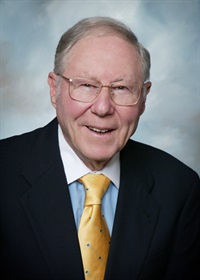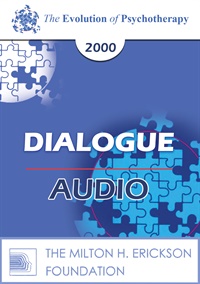EP00 Dialogue 08 - Brief Therapeutic Interventions - William Glasser, MD, and Paul Watzlawick, PhD
- Average Rating:
- Not yet rated
- Topic Areas:
- Dialogues | Brief Therapy | Intervention Strategies
- Categories:
- Evolution of Psychotherapy | Evolution of Psychotherapy 2000 | Pioneers in Couples and Family Therapy
- Faculty:
- William Glasser, MD | Paul Watzlawick, PhD
- Duration:
- 56 Minutes
- Format:
- Audio Only
- Original Program Date:
- May 28, 2000
- License:
- Never Expires.
Description
Description: Glasser and Watzlawick explore how small shifts in attitude and approach can lead to big changes in therapy. Glasser draws from his work in schools and hospitals, showing how empathy and avoiding control help build trust. Watzlawick adds stories of paradox and surprise, reminding us that change often comes when we least expect it...and that the therapist's stance can make all the difference.
Moderated by Camillo Loriedo
Educational Objectives:
- Given a topic, to become aware of the differing approaches to psychotherapy, and to identify the strengths and weaknesses in each approach.
*Sessions may be edited for content and to preserve confidentiality*
Credits
Handouts
| Timestamped Transcript (839.3 KB) | 19 Pages | Available after Purchase |
| Ericksonian Learning Snapshot (250.3 KB) | 2 Pages | Available after Purchase |
Faculty

William Glasser, MD Related Seminars and Products
William Glasser, MD, who received his MD degress in 1953 from Case Western Reserve University was an American psychiatrist. William was awarded an honorary doctorate in human letters by the University of San Francisco. Founder and Director of the Institute for Reality Therapy, he was authoer and editor of ten books on the topics of reality therapy and education. He was also the developer of Choice Theory. His ideas, which focus on personal choice, personal responsibility and personal transformation, are considered controversial by mainstream psychiatrists, who focus instead on classifying psychiatric syndromes as "illnesses", and who often prescribe psychotropic medications to treat mental disorders.

Paul Watzlawick, PhD Related Seminars and Products
Paul Watzlawick, received his Ph.D. from the University of Venice in 1949. He has an Analyst's Diploma from the C.G. Jung Institute for Analytic Psychology in Zurich. Watzlawick has practiced psychotherapy for more than 30 years. He was research associate and principal investigator at the Mental Research Institute. He was Clinical Professor at the Department of Psychiatry and Behavioral Sciences, Stanford University Medical Center. Watzlawick is a noted family therapist; he is recipient of the Distinguished Achievement Award from the American Family Therapy Association. Also, he is author, co-author or editor of eight books on the topics of interactional psychotherapy, human communication and constructivist philosophy.
He formulated five axioms. They are:
- It is not possible to not communicate. Every behavior is some kind of non-verbal communication.
- Every communication has a content. In addition, there is 'metainformation', which says how the communicator wants to be understood.
- All partners involved in a communication process also interpret their own behaviour during communication.
- Human communication involves both verbal and non-verbal communication. In addition to the spoken words, there are is also a non-spoken part (gestures, behavior, intonation..) which is part of the communication.
- Communication between humans is either symmetric or complementary. This is based on whether the relationship of those communicating is based on differences or parity.


